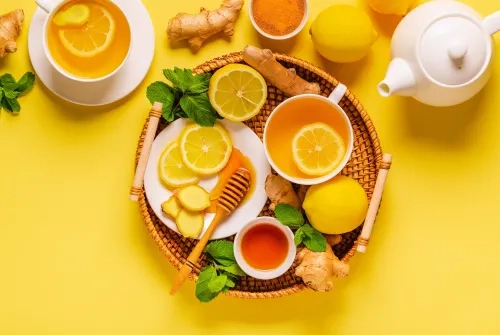Don't Be Late Fighting Against Diseases
Infectious Diseases and Clinical Microbiology Specialist "Because antibiotics do not affect viruses." says.
As the number of people sneezing and pheesing increases, the footsteps of the disease season are heard closer. In order not to spend both autumn and winter at the doctor's door with a paper napkin in your hand, you need to be careful from the beginning and take precautions now.
With the arrival of autumn, respiratory infections are more common. While viruses are responsible for 80 percent of the diseases that develop during this period, the remaining 20 percent are caused by bacteria. Therefore, Yeditepe University Hospital Infectious Diseases Specialists underline that 80 out of 100 patients who consult a doctor during these months do not need antibiotic treatment and say, "Because antibiotics do not affect viruses."
Antibiotics are not the cure!
Viruses that can cause infection in humans do not always cause disease when inhaled into the body. Especially if the virus is small in number and the person's body resistance is not suppressed, no complaints occur. The first obstacle to preventing microorganisms entering the body from the respiratory tract from settling is the nasal mucosa and sinuses. When cold air is inhaled, many blood vessels in the nose expand to keep the nasal mucosa at a certain temperature, increasing blood flow. This situation causes moistening of the nasal mucosa as a result of cold-hot heat transfer. The decrease in the protective effect on the moistened nasal mucosa paves the way for viruses and bacteria to settle, facilitating the development of infection. Experts say that the most common complaint of dry cough is encountered in patients who develop respiratory tract infections. “It is usually accompanied by one or more complaints such as fever, runny nose and sore throat. Dry cough in upper respiratory tract infections such as cold, sinusitis, laryngitis or tracheitis due to viruses usually resolves spontaneously in a short time, approximately in five to seven days. Sometimes viral infections can cause a dry cough that lasts longer than three weeks. In chronic coughs, in addition to infections, allergic rhinitis, asthma, gastro-esophageal reflux, bronchial cancer, heart failure, conversion enzyme inhibitors, beta blockers, non-steroidal anti-inflammatory drugs and aspirin should be considered. "It is important to consult a health institution without delay when there is a chronic dry cough for more than three weeks, accompanied by deterioration in general health, difficulty in breathing, feeling of pressure, blood in the sputum, or a smoker's cough turning from dry to phlegmy," he says. We received information from experts about common ailments and treatment methods in autumn.
Cold-Flu
Colds and flu, which are the most common upper respiratory tract infections in autumn and winter, are often confused with the flu. However, there are clear differences between them. In addition to a dry cough, colds also include sore and runny throat and sometimes a mild high fever. Since many and various viruses cause this, a person can catch these diseases several times throughout the season.
Treatment methods: Antibiotics have no benefit in treatment. When used unnecessarily, it causes resistance to develop in the beneficial flora bacteria in the body. The disease heals spontaneously in five to seven days. In this process, antipyretic drugs used for symptomatic treatment do not contribute to recovery. Cold and flu are among the diseases for which natural treatment methods relieve symptoms and provide faster recovery. Diagnosed patients can use natural products such as echinacea and garlic for support. However, they may have interactions with various medications, and it is important for patients who use various medications due to chronic diseases to use these plants by consulting their doctor.
Seasonal Flu
Another disease that causes symptoms with a dry cough is seasonal flu. Unlike the common cold, this disease can cause fever above 38 degrees and severe headache, muscle and joint pain. In addition, sore throat, fatigue and loss of appetite may also occur. This disease, unlike the common cold, can result in the development of pneumonia in people at risk. Other patients see improvement within five to seven days. Seasonal flu is usually seen between October and April, but is most common in November and March.
Treatment methods: People outside the risk group against seasonal flu do not need to be vaccinated. In these people, the disease resolves within five to seven days before it turns into pneumonia. As part of the treatment, the use of antiviral drugs for flu is not required. The state of the immune system also plays an important role in the fight against flu. During this period, it is necessary to stay away from foods containing trans and saturated fats and sugar, and consume plenty of vegetables and fruits instead. Choosing dishes with garlic, onion and chicken in your diet relieves the complaints. Consuming enough fluids is also important in terms of fluid loss due to fever. In addition, resting, light exercises and bed rest during the intense period of the disease, especially sleeping for 8-10 hours, increase body resistance and accelerate recovery.
Sore throat
Sore throat, which may occur during the course of viral infections such as cold and flu; It occurs in cases of angina caused by bacteria, especially group A beta hemolytic streptococci. It can cause carditis in the heart valves and nephritis in the kidneys, most commonly in children between the ages of 5-15.
Treatment methods: Antibiotics are used in the treatment of sore throat, which requires consulting a physician for diagnosis and treatment.
Who Should Get the Flu Vaccination and When?
With the onset of illnesses, debates about whether or not the flu vaccine should be taken are also on the agenda. Experts' opinion is that people in the risk group should ideally be vaccinated in the period before the onset of the disease. If this is not possible, experts recommend that people in the risk group be vaccinated at any time during the months when the disease is seen: “However, it should be kept in mind that the protective effect of the vaccine may begin after 10-15 days. Since the vaccines are not live virus vaccines, they can be easily administered dose to people in the risk group with immune deficiency. On the other hand, no vaccine in the world has 100 percent protection. This is because; It may be related to the person's age, gender, various underlying diseases, and it is also closely related to the storage conditions of the vaccine. In addition, in flu, the disease-causing influenza viruses can change their structure, so the vaccine administered that year may become ineffective. "However, it should not be forgotten that people in the risk group who get the flu vaccine, even if they catch the flu despite the vaccine, experience a milder illness or are less affected by serious and potentially fatal complications such as pneumonia."
Strengthen Your Immunity Naturally
It is necessary to invest now in order to be protected from conditions such as cold, fatigue and depression due to seasonal changes and to spend the whole winter healthy. Yeditepe University Hospital Nutritionists state that the best way to achieve this is to strengthen the immune system and make the following suggestions:
• Black cumin seed: Studies conducted; It shows that black cumin is effective in many diseases such as asthma, allergies and diabetes, as well as strengthening the immune system.
Recommendation: 1 teaspoon of ground black cumin can be mixed with 1 teaspoon of honey and consumed every morning on an empty stomach, or capsules or oil forms sold in pharmacies can also be used.
• Beta-glucan: There are great differences between the areas of use, mechanisms of action and general biological activities of water-soluble and insoluble beta-glucans. For example, water-soluble oats obtained from oats reduce the risk of cardiovascular diseases by positively affecting cholesterol and blood sugar due to the honey-like gel structure they form in the digestive system; The effect of water-insoluble substances obtained from baker's yeast on the immune system is used. Beta-glucan strengthens the immune system by supporting the activation of white blood cells that help fight infections and other diseases.
Recommendation: Beta-glucan obtained from oats has a slight immune system-strengthening effect. However, since the real effect is in those obtained from baker's yeast, it is necessary to use capsule products in pharmacies to support immunity.
• Honey: Known to relieve sore throat and have a soothing effect on cold symptoms due to its antimicrobial and antioxidant properties, honey can also be added to herbal teas not only as a treatment but also as a preventive and protective agent.
Recommendation: Adding 1 teaspoon of honey to herbal teas helps increase both its taste and antioxidant effect.
• Ginger: There are points to be considered when using ginger, which is stated to be a good source of antioxidants that can even be used in cancer treatment. While more than 1 gram of ginger may cause miscarriage in pregnant women, it can also mobilize the stone and cause blockage of the duct in those with gallstones.
Recommendation: If dry ginger is to be used, buy it as a dry root and grate it as needed; It is also important to chop or grate the fresh ones as needed. On the other hand, powdered ginger that has been stored may lose its effect as it will lose a significant amount of its components over time.
• Herbal teas: Sage, cinnamon and clove are antimicrobial due to their cineole and eugenol contents; Green tea can be used against colds thanks to its polyphenol content, linden mucilage effect, and mint leaf, elderberry, grape seed, and rosehip teas thanks to their antioxidant content.
Recommendation: You can protect yourself from colds by making herbal teas by mixing three or four of your favorite aromatic herbs at home.
Winter Soup
Materials
• 2 cups of spinach
• 1 onion
• 3-4 cloves of garlic
• 1 carrot
• 1 sweet potato
• 1 teaspoon grated fresh ginger
• 1 lemon
• 1 teaspoon of ground black pepper
Preparation of;
After boiling the vegetables for about 40 minutes, add the ginger and garlic and boil for another 5 minutes. Remove the pot from the heat and put the soup in the blender. Finally, add lemon juice and mix.
This content was prepared by Yeditepe University Hospitals Medical Editorial Board.
”
See Also
- What is West Nile Virus? What are the Symptoms and how is it Transmitted?
- Viral Hepatitis and Prevention Methods
- What Precautions Should Be Taken Against the Cold Epidemic?
- Antibiotics Kill Beneficial Bacteria, Not Viruses
- What is Hepatitis? What are the Symptoms and Treatment Methods?
- Symptoms and Treatment of Tick Bites
- Summer Infections
- Precautions Must Be Taken Against Loss of Life Due To Infection in Thalassemia
- Information on H1N1 (Swine Flu)
- Summer is Coming... Beware of food poisoning!
- Office Hygiene: The Most Common Areas Where Microbes are Found in the Office
- Our Taboos Affect the Increase in the Number of HIV-Positive Cases in Turkey
- Strep A Symptoms and Treatment
- Do Not Put a Cigarette Butt or Pour Olive Oil or Liquid Soap on the Tick
- Reheat the Food You Cooked Only Once!
- HIV Can Be Hidden for 10 Years without Any Symptoms!
- 290 Million People Live Without Knowing They Have Hepatitis
- Things to Consider When Touching Meat at Eid
- What Is Anthrax Disease?
- The Way to Fight AIDS is to Raise Awareness First
- Still Not Too Late For Flu Vaccine
- What is Rhinovirus?
- Fighting with Thalassemia: Meral Yılmaz
- Thalassemia Spreads from the Mediterranean to the Whole of Europe with Migration!
- Early Treatment of Crimean Congo Hemorrhagic Fever is Vital
- Approximately 3 Million Patients Need Blood Transfusions Every Year in Turkey
- When to Get the Flu Vaccine
- Antibiotics Account For 14% of Prescription Costs
- West Nile Virus Replaces Malaria
- It Is Necessary to Try to Be Healthy in order to Be Protected
- A New Flu Outbreak is Expected Every 10 Years
- 63% of Vector-Borne Diseases are Caused by Lyme Disease
- Experts Warn About Flu Risk
- Mosquito Infection Risk
- Why aren’t Antibiotics Working Any More?
- The World Raises an “Alarm” on Antibiotic Resistance!
- What is COVID-19?
- The Mask Requirement was Removed and the Importance of Social Distance Increased!
- How to Prevent COVID-19 in School-Going Children
- WHO (World Health Organization) Warns for Antibiotic Resistance!
- Who Is Threatened by Monkeypox?
- Ways to Prevent Coronavirus
- Swine Flu / H1N1
- Life Returns to Normal with Caution
- What is Monkeypox Virus? What Are the Symptoms of the Monkeypox Virus?
- What is Lyme Disease?
- How to Tell if You Have a Mild Coronavirus?
- Pay Attention to These Rules for COVID-19
- Hand Sanitizer Usage Guide
- The Priority Rule for the Protection from Summer Infections is Hygiene
Alo Yeditepe





